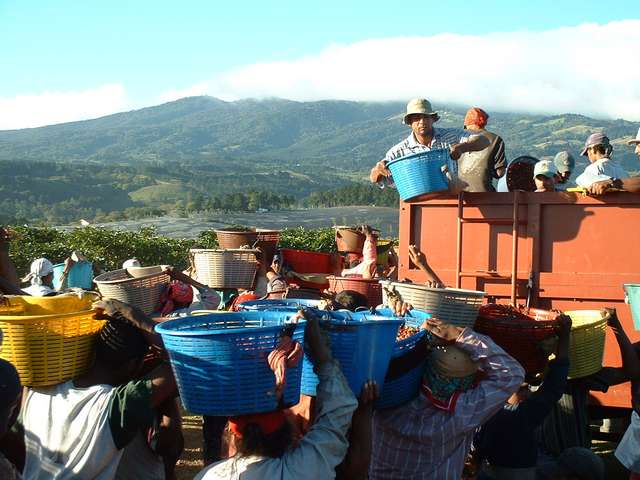New Fair Trade Relation Coffees (Relational Coffee)
"the new type of fair trade-building connections and credibility among peers is the new type of fair trade, which we also call" Relation Coffees ".
When the price of coffee is very low, fair trade is a very feasible solution. This is no longer the case. Fair trade has become a common form of high-quality specialty coffee trade, and coffee growers are well aware of their bargaining power.
You might ask, what is fair trade? I don't think many people know the answer-sometimes even coffee growers may not be able to really measure the importance of this proper term, they may simply associate "fair trade" with their own company trademark.
Fair Trade Organisation (Fair Trade Organization) defines it as: "Fair trade is to strive for better prices and decent working conditions for growers and workers in developing countries, and to safeguard local sustainable development and fair trade terms." This requires trading companies to pay a price for sustainable development, which is usually not lower than the market price. Fair trade also solves the problem of unfair traditional trade, that is, discrimination against vulnerable and poor growers. Fair trade helps to improve the social status and quality of life of growers. "
Because Fairtrade only considers the supply side of trade, the definition of Fairtrade is not perfect. Between March 2010 and March 2011, the price of coffee increased by 86%, and no one cared about the interests of coffee buyers. Many buyers have suffered great losses. In my opinion, fair trade should be the same as it literally means that goods should be bought and sold fairly, and both sides of the trade can get a fair profit from the transaction according to the quality and price of the goods.
It is necessary to look back at history to see how fair trade came into being and what important effects it has had on the coffee industry. Fairtrade was originally proposed by religious figures and non-governmental organizations in the 1940s and 1950s, mainly aimed at handicrafts sold to churches, when more donations were made.
Modern fair trade came into being as a slogan and tool to resist capitalism in Europe in the 1960s. In response to the strong advocacy of many developing countries, the United Nations formally launched the Fair Trade Movement at the Conference on Trade and Development.
Later, various organizations were set up, and there were many shops that bought and sold goods in accordance with Fairtrade principles, among which Fairtrade was the first to come into contact with alternative trade organizations and Oxfam. With the successful establishment of these Fairtrade stores, the idea of Fairtrade certificates and labels came into being. The aim of these ideas is to make markets more transparent and promote global markets towards fair trade, through the implementation of these ideas, Fairtrade goods can be implemented in a wider range of markets and trading chains. In 2012, Fair Trade Organization issued the International Fair Trade Certification Mark.
Consumers are willing to buy Fairtrade goods at higher prices, but what they don't know is whether the extra prices they pay are paid to less wealthy growers and workers, or transferred to profitable dealers or big landlords. Another point that has been criticized is that inflation is more serious because the same products are bought at higher prices, increasing the cost of living for buyers' families. In addition, corruption is caused by the excessive use of international fair trade certification marks due to the lack of monitoring.

With regard to the coffee industry, around 2000, the price of coffee remained low, about 150 cents per pound. At that time, the cost of growing coffee for farmers was increasing, reaching a low price that was unbearable. Therefore, coffee with Fairtrade certification successfully solved this problem, and coffee could be sold at a higher price. In this way, the Fairtrade certification mark has a certain value. A few years later, with the continuous use of the Fairtrade certification mark in the world market, the abuse of the logo began to appear. Some big landowners do not pay the high price of coffee to growers, their working conditions are still poor, and some companies in developed countries use the Fairtrade certification logo as a marketing gimmick, but forget their original intention to help those growers.
In 2010, the price of coffee rose intermittently, and the price of coffee with Fairtrade certification was even higher. Many buyers think that the price of these coffee with fair trade certification mark is too high, which has gradually become a consensus in the coffee industry. Now Fairtrade certification marks that the amount of coffee purchased is not much different from that of ordinary coffee.
Under such circumstances, the question arises: since the early 1960s, buyers have been helping growers, so now growers can also help buyers with high profits? Is this still Fairtrade? Moreover, more and more growers are beginning to receive education about trade, and they have acquired the ability to negotiate in the world coffee market.
Professional buyers like us are starting to trade fairly in a new way, which is what I call "relationship coffee". We need to make sure that coffee growers are doing the right thing, that the conditions for - planting are right, that the picking process is right, that coffee beans are handled in clean and hygienic conditions, and that the appearance of coffee finally meets certain standards. If all this is done, then we will pay the growers the ideal price, which is the price they deserve. In this way, they are satisfied with the price, we are satisfied with the products, and both sides are satisfied. Isn't this the so-called fair trade? We have established long-term personal relationships with all the growers associated with us, and they can hear our troubles, and we can listen to them. And we have established an intermediate platform where we can all improve and surpass, which is the new type of fair trade.
Important Notice :
前街咖啡 FrontStreet Coffee has moved to new addredd:
FrontStreet Coffee Address: 315,Donghua East Road,GuangZhou
Tel:020 38364473
- Prev

Why can't you drink green tea and coffee during menstruation?
Probably because menstruation is related to female fertility, so many women are very sensitive to menstruation, as long as something is not right, they will be very nervous and pay more attention to menstrual care. Let's take a look at eight issues that women are more concerned about menstrual health care. Although our period meets every month, but every time we are not happy, she is like the most familiar stranger in life.
- Next

The development trend of baristas
In recent years, the development trend of boutique coffee has several obvious characteristics, the most important of which is that coffee shop owners pay more and more attention to the quality of coffee, the choice of equipment, and are fully aware of the importance of good baristas to coffee shops. The style of boutique coffee shop is usually similar, according to the Melbourne aesthetic design style, it is industrial atmosphere, retro style and environmental protection.
Related
- What is the difference between Indonesian Sumatra Mantinin coffee and gold Mantinin? How to distinguish between real and fake golden Mantelin coffee?
- What does bypass mean in coffee? Why can hand-brewed coffee and water make it better?
- Unexpected! Ruixing Telunsu lattes use a smoothie machine to foam milk?!
- % Arabia's first store in Henan opens into the village?! Netizen: Thought it was P's
- Does an authentic standard mocha coffee recipe use chocolate sauce or powder? Mocha Latte/Dirty Coffee/Salty Mocha Coffee Recipe Share!
- What is the difference between Vietnam egg coffee and Norway egg coffee? Hand-brewed single product coffee filter paper filter cloth filter flat solution!
- What is the difference between sun-cured and honey-treated coffee? What are the differences in the flavor characteristics of sun-honey coffee?
- How to make Italian latte! How much milk does a standard latte use/what should the ratio of coffee to milk be?
- How to make butter American/butter latte/butter Dirty coffee? Is hand-brewed coffee good with butter?
- Is Dirty the cold version of Australian White? What is the difference between dirty coffee/decent coffee and Australian white espresso?

